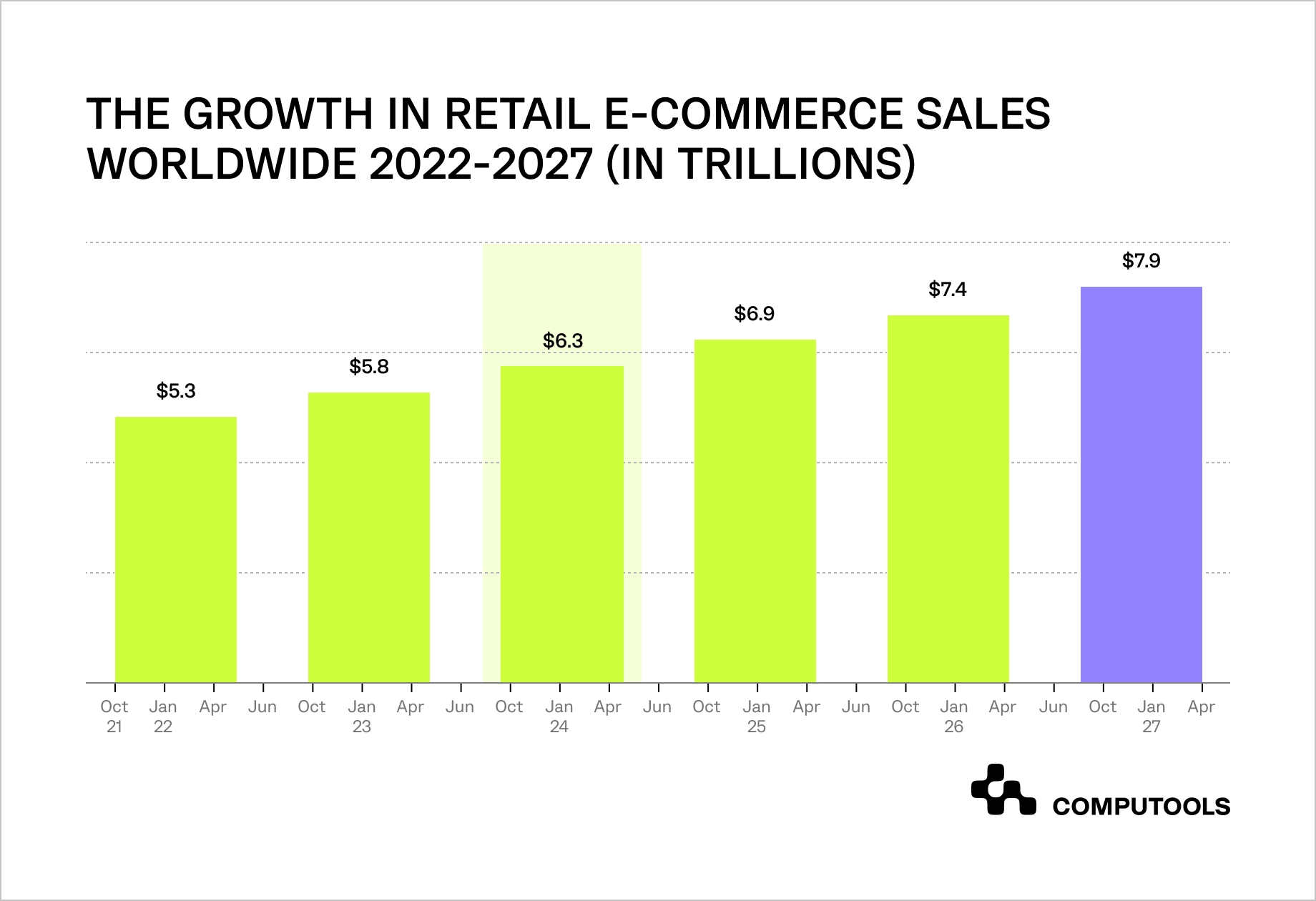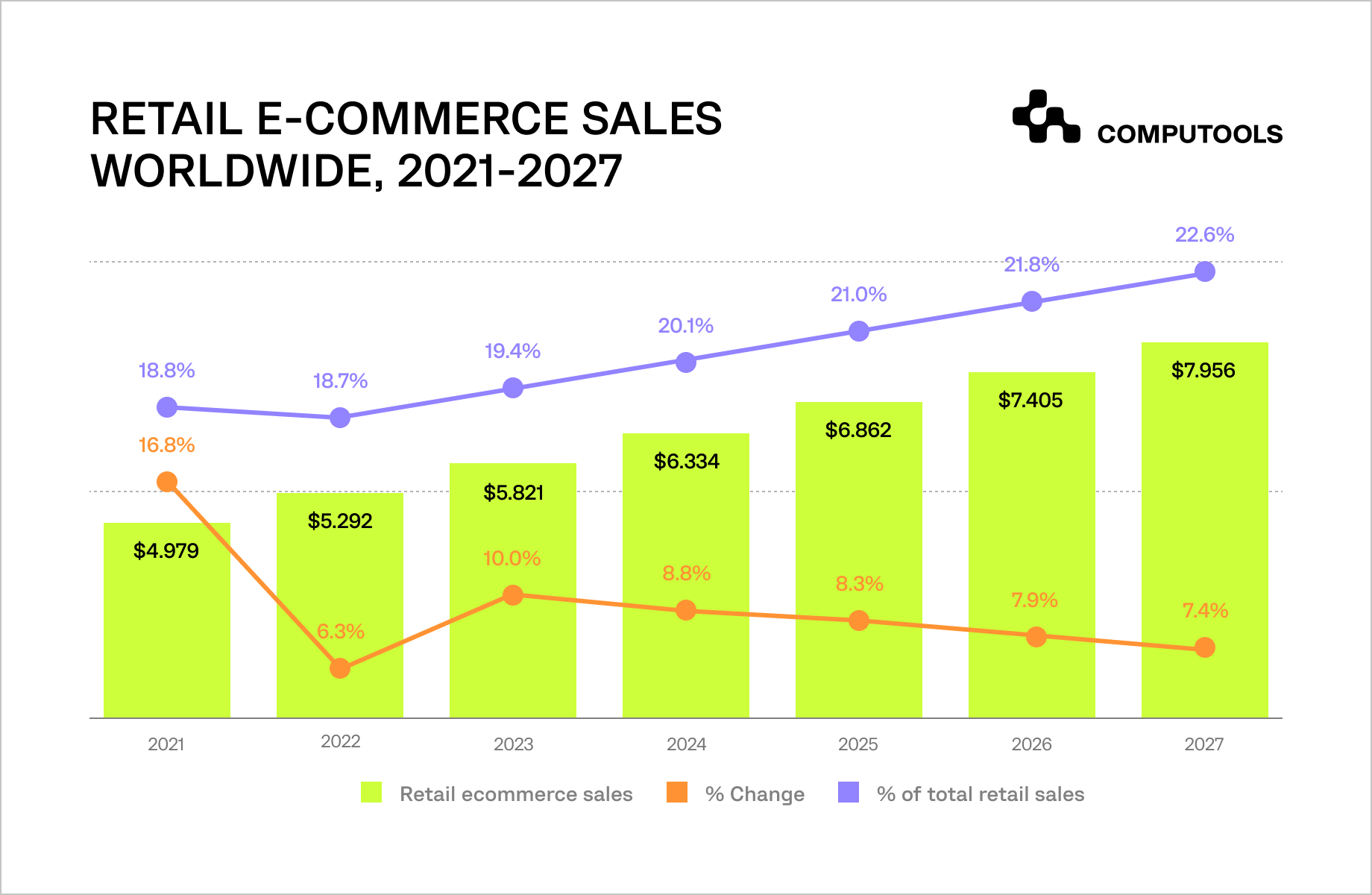Over the past few years, e-commerce has become one of the most dynamic sectors of the global economy. According to Forbes, in 2024, global online sales exceeded $6.3 trillion, and by 2027, it is predicted to grow to over $7.9 trillion.
At the same time, according to SellersCommerce, more than 65% of all online transactions will take place through online marketplaces.

The demand for fast, personalized and secure purchases is putting increasing pressure on platforms. Thousands of simultaneous orders, hundreds of partners, suppliers and customers create a complex ecosystem that is becoming increasingly difficult to manage manually. Even minor delays in data synchronization or errors in inventory management can lead to lost orders, a downgrade or seller churn.

Marketplaces that do not implement marketplace automation face typical challenges:
• inefficient order processing and excessive dependence on the human factor;
• complicated management of sellers and product catalog;
• lack of transparent analytics and real-time KPI monitoring;
• difficulties with stable scaling as the number of users grows.
At Computools, we’ve been helping retail companies implement digital transformation for over 10 years, combining a deep understanding of business processes with advanced technological solutions, and delivering 20+ successful custom software solutions for retail providers. Our expertise in retail software development services and business process automation services allows clients to achieve measurable results, from reducing manual operations to increasing profits.
One of the most striking examples of our approach is the case of Reenox, a retail marketplace that approached us with a request to improve operational efficiency. We developed comprehensive automated marketplace management solutions that integrated all processes (from inventory to customer support) into a single ecosystem.
It is based on this experience that we created a step-by-step guide that will help you understand how to automate marketplace operations to increase business productivity and scalability
How Computools automated marketplace operations for Reenox
Reenox is a large-scale B2C retail marketplace developed for one of the world’s largest retailers headquartered in Arkansas, USA, with annual revenue exceeding $500 billion. Operating across the Americas, Europe, and Asia, the company aimed to streamline management, reduce workload, and enhance efficiency across its retail ecosystem.
Computools implemented a comprehensive solution based on marketplace automation technology, integrating suppliers through APIs with internal ERP systems and deploying marketplace workflow automation to synchronize processes across departments.
The project also included order and inventory automation for marketplaces, ensuring real-time stock updates, automatic product availability control, and faster transaction processing. For analytics, BigQuery and Kafka were used to provide real-time data streaming and actionable insights, while a Vue.js interface delivered an intuitive user experience for sellers, store owners, and customers.
As a result, productivity increased by 20%, transaction time was reduced by half, and the platform became stable and scalable during peak loads.
Thanks to business process automation services, mobile app development services, and deep expertise in digital transformation for marketplaces, Computools helped the client optimize operations, enhance transparency, and turn their marketplace into a flexible, data-driven, and profitable digital platform.

How to automate marketplace operations: a step-by-step guide
Successful marketplace automation is not just the implementation of new technology, but a strategic business transformation aimed at increasing productivity, transparency, and scalability.
Using the Reenox project as an example, the Computools team has proven that properly planned automation can take marketplace efficiency to a new level. Below is a step-by-step approach that we use in our practice to help businesses automate marketplace operations and achieve measurable results.
1. Assessing current processes
The first stage is a deep audit of all operations. It is important to determine where the business loses efficiency.
To do this, it is necessary to analyze the processes related to:
• order processing;
• communication with sellers;
• inventory updates;
• customer support;
• reporting and monitoring of KPI indicators.
A thorough assessment allows you to see “bottlenecks” — duplication of tasks, manual processes, delays in data updates. Use productivity tools for online marketplaces to visualize processes and capture points of inefficiency. That’s how we started working with Reenox — by mapping current business processes to identify critical areas that needed optimization.
2. Technology platform selection
Based on the audit, a technology strategy is formed. Modern marketplace automation platforms must support integration with ERP, CRM and CMS systems, as well as ensure scalability and information security.
Key platform requirements:
• availability of an open API;
• flexibility in configuring modules;
• compliance with GDPR and PCI DSS requirements;
• ability to quickly expand functionality.
Computools uses a modular approach that enables gradual development of solutions, adapting them to the growing needs of the business. In the case of Reenox, an architecture was built based on marketplace automation technology, integrated with the client’s existing corporate systems. This created a unified information space for managing data, orders, and suppliers.
3. Automation of key processes
It is at this stage that the main marketplace workflow automation takes place.
For most retail platforms, three areas are critical:
• Ordering and inventory.
Implementing order and inventory automation for marketplaces reduces human dependency, reduces errors, and improves inventory control accuracy. In the Reenox project, this solution ensured automatic updates of product availability data, helping to prevent both surpluses and shortages.
• Seller management.
Marketplace seller management automation simplifies supplier onboarding, monitoring of their activities, and sales analytics. This is especially important for large B2C platforms with hundreds of partners.
• Customer support.
Automated marketplace customer service solutions based on artificial intelligence can handle requests 24/7, reducing the workload on operators and increasing user satisfaction. At Reenox, the integration of chatbots and rapid response systems reduced the response time to customer requests by 60%.
4. Integration with analytical data
Effective marketplace automation is always accompanied by advanced analytics capabilities. With the help of marketplace process automation software, companies gain continuous access to real-time performance insights, allowing them to measure and improve key indicators such as:
• order fulfillment time;
• speed of response to customer requests;
• seller satisfaction level;
• share of automated processes in the overall structure.
In the Reenox project, we implemented deep integration with BigQuery and Kafka, which allowed us to collect and process large amounts of data in real time, opening access to accurate analytical reports for managers. This has become an important tool for quick decision-making and demand forecasting.
5. Testing and scaling
The last step is testing the entire ecosystem under load. The system must remain stable with an increase in the number of users, transactions, and suppliers. Only after passing the load test can expand the functionality and launch new markets.
In the case of Reenox, after several rounds of testing, we proved the system’s stability under peak loads, which allowed the client to scale the marketplace without additional investment in a support team. The result was a 20% increase in overall productivity and a steady increase in operational efficiency.
Thus, properly planned marketplace automation is not just about implementing technology, but about creating a flexible, integrated business ecosystem. It unites people, processes and data, ensuring sustainable growth even in a highly competitive e-commerce environment.
Must-have elements of successful marketplace automation
Marketplace automation is not only about efficiency, it’s about creating a connected, data-driven ecosystem where every process supports business growth. Intelligent automation eliminates human error, accelerates decision-making, and provides full control over inventory, logistics, and customer interactions.
By connecting ERP systems, AI-driven analytics, and centralized dashboards, marketplaces gain real-time visibility into performance and can predict demand with greater accuracy.
This transformation goes far beyond operational optimization. Automated marketplaces build transparency and trust between sellers, managers, and customers, turning fragmented processes into a single, self-sustaining system. As a result, businesses can scale faster, plan smarter, and deliver consistently high service quality across every channel.

Discover how automating marketplace operations transforms fragmented processes into a unified, high-velocity engine that elevates productivity and reduces cost-to-serve.
Challenges and benefits of marketplace automation for retail
| Challenge | Solution (Marketplace Automation) | Business Benefit |
| Manual inventory management, data errors | Automatic stock updates and product availability control | Minimized overselling, accurate data, reduced sales losses |
| Slow order processing | ERP integration + order automation | Order processing time cut almost in half |
| Complex seller management | Automated onboarding, monitoring, and seller analytics | Transparency, faster partner onboarding, increased trust |
| High support workload | AI chatbots and rapid response systems | 24/7 support, 60% faster response, cost savings on staff |
| Lack of transparent analytics | Integration with BigQuery, Kafka, and analytics dashboards | Real-time decision making, accurate demand forecasting |
| Limited scalability | Load testing and system optimization | Stable operation under peak loads, ability to scale without extra resources |
How to choose a developer for marketplace automation
When retail or eCommerce companies look for a reliable partner to automate their marketplace, they should pay attention to several key aspects:
1. Experience in business process automation services.
The developer should have a deep understanding of how to optimize internal workflows, integrate them into a unified platform, and eliminate manual operations.
2. Proven case studies in retail software development.
For companies operating in retail or multi-vendor environments, it’s crucial that the partner has real-world examples of successful automation projects. These cases demonstrate not only technical skills but also an understanding of business logic and operational challenges.
Equally important is a strong track record supported by proven reviews on platforms like Clutch, which helps validate the partner’s reliability and client satisfaction.
3. Expertise in mobile app development services.
If the marketplace includes a mobile segment, the partner must ensure seamless app performance, intuitive UX, and stable synchronization with the main platform.
4. Integration and scalability capabilities.
The chosen company should be able to integrate new features or third-party systems (ERP, CRM, logistics) and scale the platform as the business grows.
5. Strategic vision and practical mindset.
A strong partner combines technical and subject matter expertise with a business-oriented approach, offering not just development, but practical solutions that optimize daily operations and improve profitability.
Why Computools?
Computools is an international company with offices in the USA, UK, Poland, and Ukraine, specializing in digital transformation for marketplaces and E-commerce marketplace automation. Drawing on extensive experience in retail and platform innovation, Computools transforms how multi-vendor marketplaces operate, automating processes, improving efficiency, and helping companies grow sustainably without sacrificing quality.
The company’s expertise is proven through its cases. In the CCI Assistant project, Computools modernized a mobile cash management application, replacing an outdated system with a cross-platform solution that enhanced speed, security, and user experience for a client managing over $4 billion daily.
In the GoneTrippin project, the team created an innovative blockchain-powered travel app that enabled secure payments, connected small businesses to the US travel market, and expanded monetization through TG tokens, increasing user engagement and business revenue.
Conclusion
Marketplace automation is no longer just a tech trend, it’s a core driver of business efficiency and competitiveness. End-to-end automation enables companies to manage orders, inventory, and seller interactions seamlessly while reducing errors and operational costs.
With Computools’ expertise in automating multi-vendor marketplace operations, businesses gain an integrated ecosystem that connects people, processes, and data. This boosts productivity, transparency, and scalability without increasing resource load.
Projects like Reenox, CCI Assistant, and GoneTrippin show how smart automation can transform marketplaces, streamlining workflows, building trust among sellers and users, and unlocking new opportunities for growth and monetization.
Computools
Software Solutions
Computools is a digital consulting and software development company that delivers innovative solutions to help businesses unlock tomorrow.









“Computools was selected through an RFP process. They were shortlisted and selected from between 5 other suppliers. Computools has worked thoroughly and timely to solve all security issues and launch as agreed. Their expertise is impressive.”